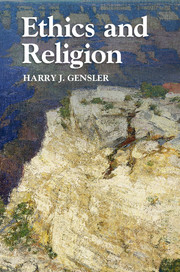7 - Ethics without God
from PART III - ETHICS AND ATHEISM
Published online by Cambridge University Press: 05 May 2016
Summary
Our final two chapters are about ethics and atheism. Chapter 7 considers how atheists raise ethical objections to religion and how they view ethics. We'll begin with Bertrand Russell; I picked him because of his philosophical stature and strong opposition to religion. Chapter 8 responds to objections.
When I discuss nonbelievers, I have in mind Western-style atheists and agnostics with a scientific worldview; I'm not thinking of traditional Buddhists (who accept reincarnation but no God), or polytheists. I assume traditional definitions of “theist,” “atheist,” and “agnostic”:
• A theist is one who believes that there's a God. “God” here means roughly what Copleston and Russell (1948: 390) agreed to in their radio debate: “a supreme personal being – distinct from the world and creator of the world.” This belief that there's a God may be seen as certain or uncertain, as backed up by firm argument or not so backed up.
• An atheist is one who believes that there's no God. Again, this belief may be seen as certain or uncertain, as backed up by firm argument or not so backed up.
• An agnostic is one who takes no stand on whether there's a God. So agnostics are undecided about God.
Another usage sees a theist as one who thinks the evidence conclusive that there's a God, an atheist as one who thinks the evidence conclusive that there's no God, and an agnostic as one who sees the evidence as inconclusive. I dislike this usage because it strangely takes fideists to be agnostics if they firmly accept God on faith despite inconclusive evidence.
This “ethics without God” chapter focuses on atheists; but most of what I say also applies to agnostics. For some nonbelievers, the atheist/agnostic distinction isn't important; Russell variously called himself “atheist” or “agnostic.”
Bertrand Russell
Bertrand Russell (1872–1970), one of the most important philosophers of the twentieth century, was born into an aristocratic British family. He lost his parents as a toddler; his grandmother raised him Christian. He struggled with faith as a teenager; he rejected free will and the afterlife but for a time continued to accept God as first cause. At age eighteen, he rejected belief in God upon reading Mill's objection to the first-cause argument (§7.2.1); he remained a nonbeliever for the rest of his life.
- Type
- Chapter
- Information
- Ethics and Religion , pp. 135 - 153Publisher: Cambridge University PressPrint publication year: 2016

